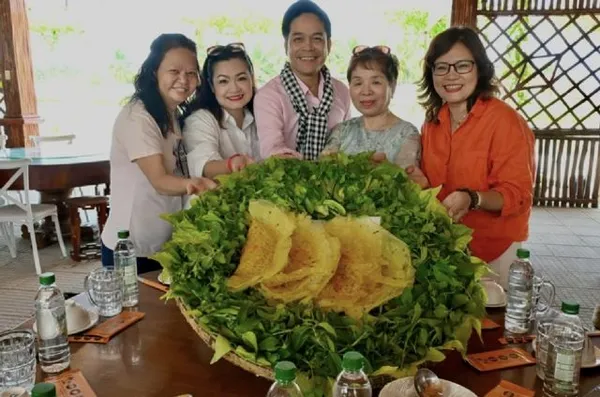 Travel
Travel

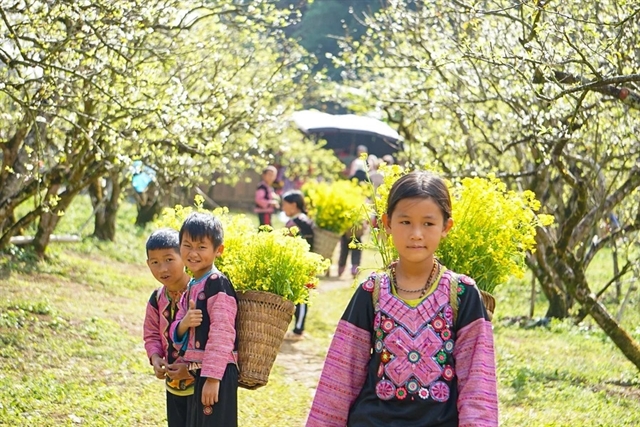
|
| Children in Nà Ka plum valley. — VNA/VNS Photo Khánh Hòa |
By Thanh Nga
With the advantage of its mountainous terrain, Sơn La Province boasts numerous strengths in agriculture. In recent years, it has also garnered attention for its tourism potential. With its rich and diverse tourism resources and pristine natural landscapes untouched by extensive human impact, Sơn La has become an attractive tourism destination. Let's explore five captivating attractions in Sơn La.
Mộc Châu Plateau
Mộc Châu Plateau is an alluring tourist destination in northern Việt Nam. With an average altitude of 1,050m, it is famous for its cool climate and fertile soil. Surrounded by mountains, Mộc Châu Plateau experiences cool summers, cold autumns and winters, and warm springs. As a result, Mộc Châu is captivating to explore year-round.
Late November to early December mark the season of white mustard flowers, blanketing the hillsides and mountainsides. From late December to January of the following year, the hills come alive with white plum and apricot blossoms. Visitors can immerse themselves in the beauty of these flowers and even visit strawberry gardens to pick and enjoy fresh strawberries from January to March.
In March and April, the forests of Mộc Châu are adorned with white bauhinia flowers, adding a touch of elegance and gentleness to the northwest region. This beauty has inspired many artists, finding its way into poetry, songs and paintings.
May is the time when plums ripen, offering succulent, round fruits that hang heavily on the trees. Harvesting plums in the plateau is an unforgettable experience for visitors. Currently, there are three large plum-growing areas in Mộc Châu that tourists can visit and enjoy: Nà Ka plum valley, Mu Náu and Phiêng Khoang plum forests.
June and July are the months when Mộc Châu residents harvest peaches. In August, despite the absence of flowers, Mộc Châu retains its beauty and tranquillity. The mist-covered green tea hills create picturesque scenes evoking the image of a slumbering princess. During this time, visitors can personally pick avocados and persimmons.
Apart from the seasonal attractions, Mộc Châu offers year-round tourist destinations such as the verdant Mộc Châu tea hills, Bat Cave relic area, Tây Tiến army relic area, Pha Luông Peak, Bản Áng pine forest, and Dải Yếm Waterfall. In addition to its stunning natural landscapes, Mộc Châu Plateau is a land of cultural diversity, boasting delicious food and hosting many interesting festivals for visitors to experience.
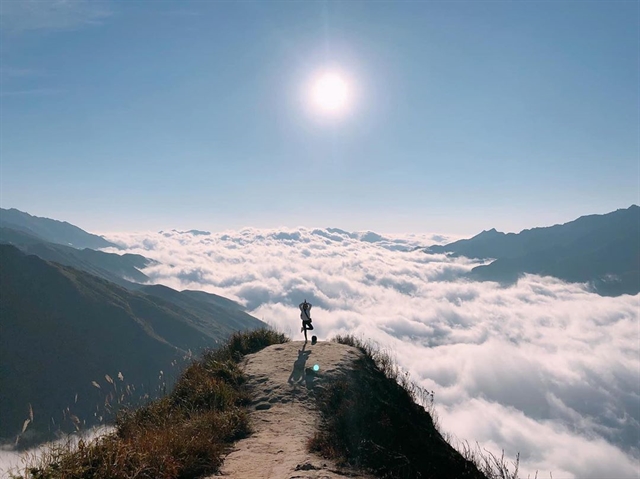
|
| The ideal time for cloud hunting in Tà Xùa is from October to April. — Photo gotrip24h.com |
Tà Xùa Cloud Hunting Paradise
Tà Xùa, situated in Bắc Yên District, Sơn La Province, is blessed with natural wonders such as a cloud-filled paradise, hundred-year-old Shan Tuyết tea trees, and the pristine culture of the native Mông people.
Located at an altitude of over 1,500m above sea level, Tà Xùa is renowned for its breathtaking morning views and magnificent mountains.
The ideal time for cloud hunting in Tà Xùa is from October to April. However, witnessing the valley shrouded in white clouds is not an everyday occurrence. According to the Mông people, days with monsoons or light rain the previous night followed by sunny mornings create the perfect conditions for clouds to blanket the valley.
Visitors to Tà Xùa can capture stunning photographs at iconic spots such as the dinosaur spine in Háng Đồng, turtle head rock and the Tà Xùa primeval forest.
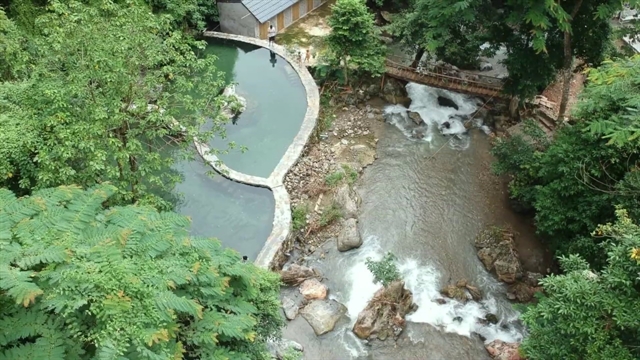
|
| Mòng Village attracts tourists due to its abundant hot mineral springs. — Photo sonla.gov.vn |
Mòng Village
Mòng Village, located in Hua La Commune, is an enchanting eco-tourism, resort and cultural destination situated approximately 6km from Sơn La City centre.
The journey to the village is now made more accessible with the beautifully winding paved road along the hillsides.
The village is home to over 106 Thái households whose livelihoods primarily revolve around wet rice cultivation, animal husbandry and traditional arts like brocade weaving and embroidery. The traditional cultural values of the Thái people, including their costumes, jewellery, cuisine, traditional festivals, folk songs and dances, have been well-preserved.
Mòng Village also attracts tourists due to its abundant hot mineral springs. With a stable water temperature ranging from 36 to 38 degrees Celsius and no unpleasant odour, visitors can enjoy bathing in the hot springs any time of the year.
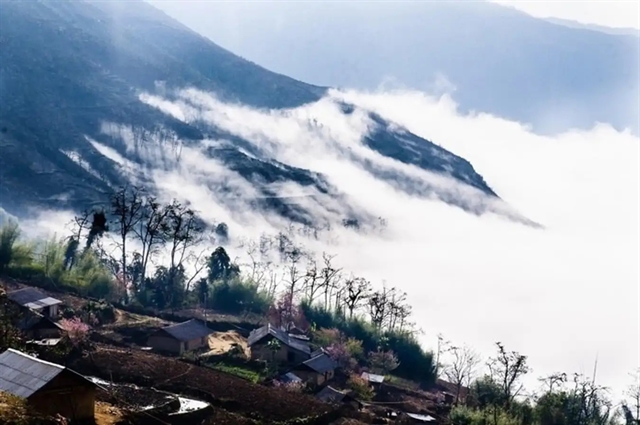
|
| Hồng Ngài Village in Sơn La Province. — Photo traveloka.com |
Hồng Ngài
Hồng Ngài is a charming village located in Bắc Yên Town, Bắc Yên District, Sơn La Province. Nestled deep within the northwest mountains and forests, approximately 103km from the province centre, Hồng Ngài exudes a simple and untamed beauty, resembling a shy mountain girl.
This village is the homeland of the Mông people and is renowned for its 71 traditional clay houses, which serve as a tourism highlight in the northwest region of Việt Nam.
For travellers who are passionate about exploring pristine natural settings free from the hustle and bustle of urban life, Hồng Ngài is the perfect choice. Here, you will find golden terraced fields, expansive green forests and clear blue skies, creating a serene and idyllic atmosphere.
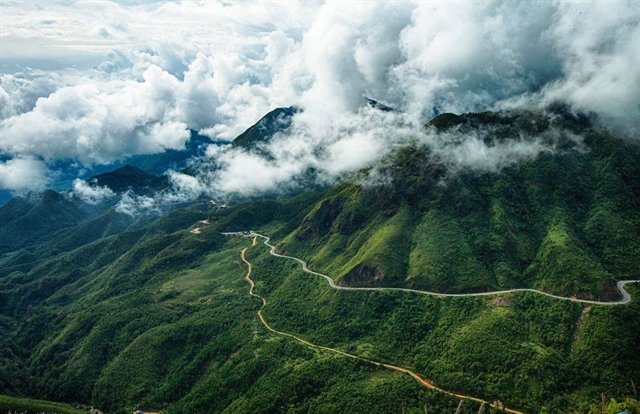
|
| Pha Đin Pass is considered one of the four great passes of the northern mountains. — Photo taybacsensetravel.com |
Pha Đin Pass
Pha Đin Pass stretches approximately 32km and is situated along Highway 6, connecting Sơn La and Điện Biên Provinces. This pass is considered one of the four great passes of the northern mountains, alongside Ô Quy Hồ Pass, Khau Phạ Pass and Mã Pì Lèng Pass, attracting numerous tourists.
The name "Pha Đin" means the meeting point of heaven and earth. The pass reaches its highest point at an elevation of 1,648m above sea level and features a television tower weighing around 70 tons, designed to withstand winds of up to 200 km/h.
The terrain of Pha Đin Pass is treacherous and precarious, with one side being steep cliffs and the other, a deep abyss. Clouds often envelop the pass halfway up, while villages can be found at the foot of the pass.
Standing on the slope of the pass in Điện Biên Province and gazing downwards, visitors are treated to the awe-inspiring view of the Mường Quài valley, adorned with endless green hills and mountains, with occasional glimpses of the villages in Tuần Giáo District. However, as one approaches the summit of the pass, villages become scarce, and the vista transforms into a seamless blend of the deep blue sky and majestic mountains and forests.
These are just a few examples of the many attractions you can explore in Sơn La Province. Whether you're interested in natural beauty, cultural experiences or historical sites, the province offers a diverse range of options for travellers. VNS




